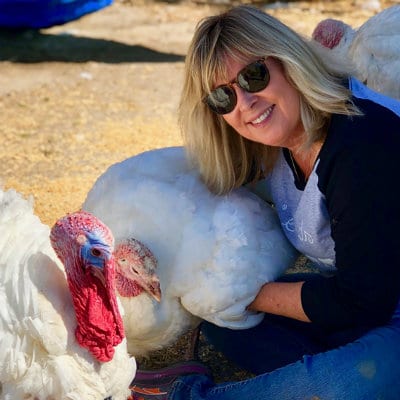There are three broad reasons why people become vegetarians – for the animals, for their health and for the planet.
For most people, this is one of the reasons that drives them to become vegetarian, and then they go on to learn more about the other benefits that encourage them to continue with a vegetarian diet. In this post, I will look at the facts behind the main reasons why people become vegetarians. I also interviewed several vegan bloggers who shared their reasons for becoming vegan.

1. For animals
Preventing the exploitation of animals is a key reason many people decide to become vegetarian. Vegans believe that non-human animals deserve the same rights as humans, including the right to be free from pain, fear, and suffering.
Many omnivores, even vegetarians, are oblivious to the fact that it is impossible to produce meat, eggs, and dairy products without animal suffering. There is no such thing as cruelty-free animal products. Watching video footage from farms and slaughterhouses can be a simple thing that opens people’s eyes to the cruelty of animal agriculture.
Avoiding animal products is the easiest way to take a stand against animal cruelty and animal exploitation.

Long before it became a popular thing, I gave up eating meat. Over the years, I felt at odds with eating animals, because I really cared about them. Once I made the connection with the reality of the food I was eating, there was no turning back. I could no longer turn a blind eye to the brutal truth of factory farming and animal exploitation and instead chose to use my voice to protect animals. It was a remarkably liberating experience. This is why I became a vegetarian.
Connie runs the vegan blog TheCarrotUnderground.com
2. For better health
Carefully planned vegetarian meals are often much healthier than meals that contain large amounts of meat and dairy.
The British Dietetic Association affirms that a well-planned vegan diet “can support healthy living in people of all ages” while the American Academy of Nutrition and Dietetics states that properly planned vegetarian diets can be “healthy, nutritionally adequate and provide health benefits. Prevention of certain diseases and treatment.”
There are many documentaries that show how diets heavy in meat and dairy are fueling the obesity epidemic, and also some that show the health benefits experienced by those who have switched to a plant-based diet.

I chose to transition to a plant-based diet for health reasons. Reducing my animal fat intake has greatly helped me fight inflammation throughout my body. Since being on a plant-based diet, I now feel more spring in my step. I also enjoy transforming traditional recipes into plant-based recipes, I find this challenge fascinating.
Janelle runs the plant-based food blog PlantBasedFolk.com
Of course, not all vegan foods are healthy and ‘junk food vegans’ definitely exist. Going vegan is a great opportunity to learn about nutrition, try new foods, and improve your cooking skills.
When you get all your nutrients from plants, you’ll have more opportunities to add healthy options like fruits, vegetables, whole grains, nuts, and seeds that are full of vitamins and minerals.
Suggested Reading: 20 Plant-Based Recipes I Ate to Lose 60 Pounds

I first became a vegetarian for health reasons. For months I was coming home from work so exhausted I had to go straight to bed. I decided to try veganism to see if it would help my energy levels. The first day, a friend sent me a few minute video on YouTube about animal welfare and I almost vomited. I wasn’t going back after that anyway, but as a fun bonus it definitely helped my energy level significantly! Even when I eat vegetarian junk food I feel remarkably better than I did as an omnivore.
Nava runs the vegan food blog YumVeganLunchIdeas.com
3. For the environment
More and more people are doing their part to help the environment by reducing plastic waste, conserving water and getting better at recycling. But did you know that avoiding animal products is one of the most effective things you can do to reduce your carbon footprint?
Meat and dairy are incredibly bad for the environment. Vast areas of rain are destroyed every day to make room for soybean crops used to feed livestock. If these crops were used directly to feed people, the world would have enough food for everyone, ending malnutrition in developing countries.
Meat production uses large amounts of water to grow crops that feed animals as well as fuel to transport both grain feed, animals and animal products.

My main reason for becoming a vegetarian was to help the environment. I’m passionate about reducing my impact on the planet – ever since I learned how much the animal agriculture industry contributes to climate change and deforestation (especially the Amazon rainforest) I knew I couldn’t continue eating animal products.
My other reason is health, although I only realized this after I committed to the diet. I was never so healthy! Since going vegan I feel more energetic than ever. It’s been such an easy transition, too. I see no reason to go back now as it has been a positive change for both me and the environment.
Hannah runs the lifestyle blog PagesPlacesandPlates.com
How to make a change
Whatever your reasons for trying a vegan diet, you’ve already taken the first small steps by doing the research. It is important to educate yourself about exactly what is involved in animal agriculture and why people become vegetarians so that you can make your own informed decision.
Every time you switch an animal product for a vegan product, you’re helping animals, improving your health, and saving our planet for future generations.

We are a wife and husband couple raising two daughters. Since our first child started eating solids we have become more aware of what we eat and what we should give him. We’ve been reading a lot about nutrition and healthy eating, when my husband stumbled upon the documentary Forks Over Knives on Netflix. It was so powerful that after doing some research to see if the claims were actually true, we quickly switched back to a plant-based diet. And we couldn’t be happier. Getting to know the vegan community opens our eyes and hearts to what’s really behind our food. We feel lighter, healthier and happier at the same time.
Emese and Nandi run the vegan and gluten-free blog MyPurePlants.com
If you’re considering becoming a vegan yourself, why not try the One Month Vegan Challenge?

